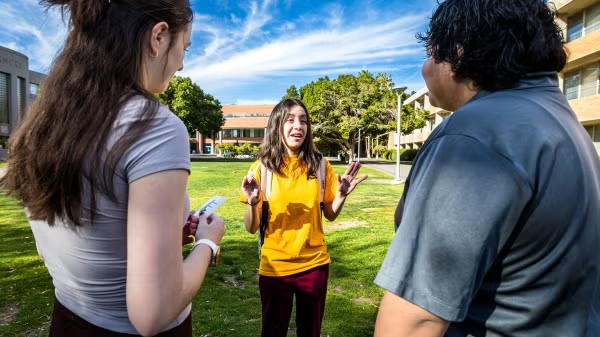ASU graduate seeks to improve outcomes for Native Americans in criminal justice system

Cassie Johnson is the Spring 2017 Outstanding Graduate of the School of Criminology and Criminal Justice.
Editor’s note: This is part of a series of profiles for spring 2017 commencement. See more graduates here.
Cassie Johnson was a self-described troublemaker growing up.
“I would test the authority figures in my life and was in trouble on and off,” she said.
She got in enough trouble as a teenager to spend time in the juvenile justice system. She also had a drinking problem and became a victim of teenage domestic violence.
So family and friends might have been a little surprised that she chose to pursue a criminal justice degree. She is the Spring 2017 Outstanding Graduate of the School of Criminology and Criminal Justice in the College of Public Service and Community Solutions in downtown Phoenix.
“When I was going through that phase, I couldn’t relate to anyone who was trying to talk to me — counselors in school, probation officers. It would shut me down,” Johnson said. “I want to fill that gap for others and do something better.”
In January, Johnson began working for a well-established Girl Scout program that helps at-risk girls in communities throughout Arizona by teaching decision-making and leadership skills.
“We work with girls who are on probation, mothers who are incarcerated — it is closely related to criminal justice and has given me a new perspective on this degree,” she says. “It isn’t so black and white. You don’t have to go straight into law enforcement to make a difference.”
Johnson doesn’t immediately share her own experiences with the girls, but says as they ask questions she can feel them open up. It breaks down the wall that she felt growing up in Page, Arizona.
She readily admits her first attempt at higher education failed. Lack of maturity, poor decisions and heavy drinking caused her to drop out her freshman year and move back home. That’s when Johnson made a conscious decision to turn her life around. She stopped drinking, ended negative friendships and made a commitment to a positive lifestyle that included going back to school.
It wasn’t easy. For one and a half years, she drove two hours each way to attend classes at Coconino Community College in Flagstaff. But it paid off. Johnson earned All-Arizona Academic Team honors before transferring to ASU to study criminology and criminal justice.
“At the beginning, it was hard to stay determined and keep focused. School taught me a lot about how to manage time. I wouldn’t trade the experience,” she says.
At ASU, Johnson added a second degree in public service and public policy offered by the College of Public Service and Community Solutions. As part of her capstone class, she did a synthesis on criminal disenfranchisement and the collateral consequences of criminal conviction.
“It hits close to home,” she admited. “I can feel the repercussions of a criminal background. Even today, I have to jump through hoops and obstacles to get my foot in the door.”
She says she wanted to know more about the collateral consequences of criminal conviction, even misdemeanors. How does that impact housing, applying for jobs, pursuing education? In particular, Johnson wanted to know where Native Americans fit in. As part of her work, it became clear that there is a lack of data.
At the end of the semester, Johnson wrote a letter to the leaders of the Navajo Nation, the tribal government based in Window Rock. She pointed out that Native Americans are overrepresented in the criminal justice system in Arizona. She noted issues that relate to Native Americans and the lack of research in this area.
“That might be what I want to do,” she says. “I want to do some sort of research and it is clear there is a need here.”
“Ms. Johnson’s story is inspiring and we’re extremely proud of what she has been able to accomplish,” said Cassia Spohn, director of the School of Criminology and Criminal Justice. “Her commitment exemplifies what this school is all about — looking for solutions to the problems that plague the criminal justice system.”
For Johnson, obtaining an advanced degree at ASU is part of the plan.
“In a way, some may see it as coming full circle. I started off doing so bad, and then to make that change and want to help others,” she said.
“From my own journey, I want others to see that it is not too late to make positive changes. It is possible. It may be hard, but it is possible!”
Written by Heather Beshears, contributing writer
More Sun Devil community

Photos: 2025 Tempe Open Door
Arizona State University's 13th year of Open Door events concluded on the Tempe campus on Feb. 22.Snakes, science and little pig…

Adventure coaching takes student support outdoors
On a recent sunny morning, a circle of Arizona State University students is flinging colorful balls and toys to each other on a…

Photos: 2025 Polytechnic Open Door
Families explored sound, automotive technology and other engineering fun at Saturday's ASU Open Door, where the Polytechnic…